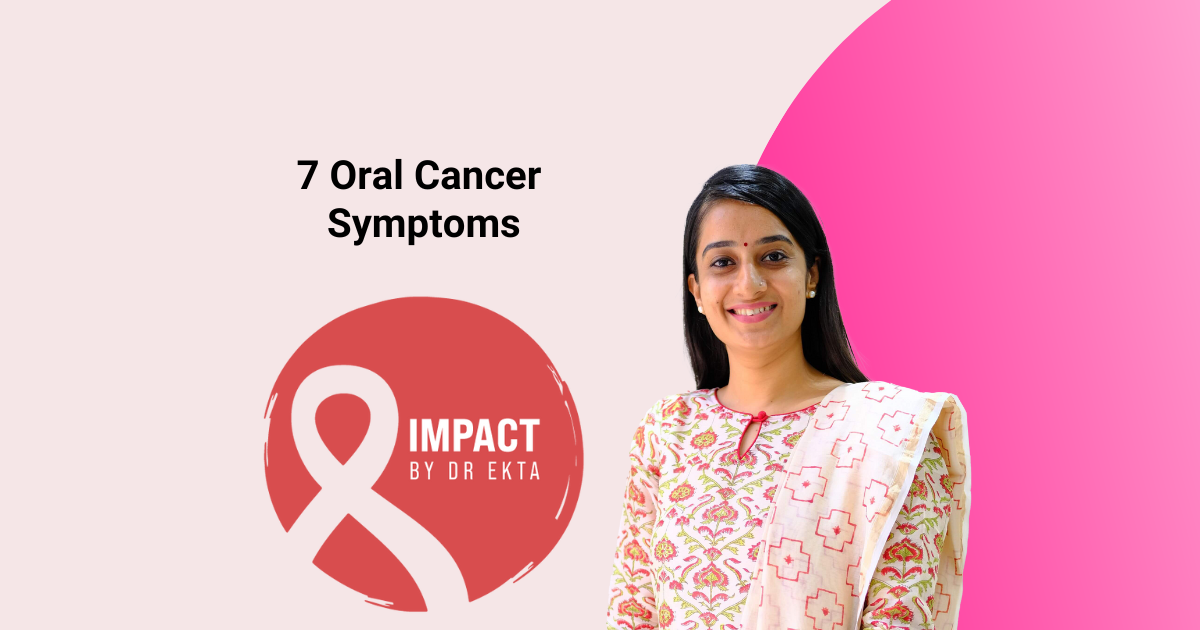Oral cancer is a serious condition that affects thousands of people worldwide each year. Detecting it early can significantly improve treatment outcomes. Understanding the oral cancer symptoms can help individuals seek medical attention before the disease progresses. In this blog, we will discuss seven key oral cancer symptoms, risk factors, and when to consult a doctor.
What Is Oral Cancer?
Oral cancer refers to cancer that develops in any part of the mouth, including the lips, tongue, gums, inner cheeks, roof, and floor of the mouth. It is a type of head and neck cancer and can spread to nearby tissues if left untreated.
7 Oral Cancer Symptoms to Watch For
1. Persistent Mouth Sores
- Ulcers or sores in the mouth that do not heal within two weeks can be an early sign of oral cancer.
- These sores may bleed easily and become painful over time.
- Unlike common mouth ulcers, cancerous sores do not improve with home remedies.
2. White or Red Patches in the Mouth
- Leukoplakia (white patches) and erythroplakia (red patches) in the mouth can be precancerous conditions.
- These patches may feel rough or thick and do not go away on their own.
- If you notice abnormal patches, consult a dentist or doctor for evaluation.
3. Difficulty Swallowing or Chewing
- A persistent sensation of something being stuck in the throat.
- Pain or discomfort while chewing, swallowing, or moving the tongue.
- Unexplained weight loss due to difficulty eating.
4. Lump or Thickening in the Mouth or Neck
- A lump in the mouth, gums, or throat may indicate oral cancer.
- Swelling or thickened tissue in the cheek or jaw can also be a warning sign.
- If you feel an unexplained mass in your mouth or neck, seek medical advice immediately.
5. Chronic Hoarseness or Voice Changes
- Persistent hoarseness or a change in voice tone lasting more than two weeks.
- Difficulty speaking clearly or a sudden change in speech patterns.
- These symptoms may indicate cancer affecting the vocal cords or throat.
6. Numbness or Pain in the Mouth
- Unexplained numbness in the lips, tongue, or other areas of the mouth.
- Persistent ear pain without signs of an ear infection.
- Burning sensations in the mouth, which do not improve over time.
7. Loose Teeth or Poor Healing After Dental Work
- Sudden tooth loss without an apparent cause.
- Difficulty healing after a tooth extraction or dental procedure.
- Swelling in the jaw that affects denture fit.
Risk Factors for Oral Cancer
Several factors increase the risk of developing oral cancer symptoms:
- Tobacco Use: Smoking cigarettes, cigars, or using smokeless tobacco significantly raises the risk.
- Excessive Alcohol Consumption: Heavy alcohol use is a major contributor to oral cancer.
- Human Papillomavirus (HPV) Infection: Certain strains of HPV are linked to oral and throat cancers.
- Prolonged Sun Exposure: Increases the risk of lip cancer.
- Poor Oral Hygiene: Chronic gum disease and poor dental care can contribute to cancer development.
- Weakened Immune System: Individuals with compromised immunity are at higher risk.
When to See a Doctor
If you experience any of the oral cancer symptoms mentioned above for more than two weeks, consult a healthcare provider. Early detection can improve treatment success and survival rates.
Diagnosis of Oral Cancer
To diagnose oral cancer, doctors may recommend the following tests:
- Physical Examination: A thorough check of the mouth, throat, and neck for abnormalities.
- Biopsy: A tissue sample is taken from suspicious areas for laboratory analysis.
- Imaging Tests: CT scans, MRI, or X-rays help determine the extent of the disease.
- Endoscopy: A flexible camera is used to examine deeper areas of the throat.
Treatment Options for Oral Cancer
Treatment depends on the stage of cancer and overall health of the patient. Common treatments include:
1. Surgery
- Removal of the tumor and affected tissues.
- In advanced cases, reconstruction may be needed after surgery.
2. Radiation Therapy
- High-energy radiation is used to destroy cancer cells.
- Often used in combination with surgery or chemotherapy.
3. Chemotherapy
- Medications that kill or slow cancer cell growth.
- Used for advanced cases or when surgery is not an option.
4. Targeted Therapy
- Drugs that attack specific cancer cell mechanisms.
- Often used for HPV-related oral cancers.
5. Immunotherapy
- Boosts the body’s immune system to fight cancer cells.
- Suitable for some patients with advanced-stage cancer.
Preventing Oral Cancer
While not all cases can be prevented, lifestyle changes can significantly reduce the risk:
- Quit Smoking and Avoid Tobacco Products.
- Limit Alcohol Consumption.
- Maintain Good Oral Hygiene with regular dental check-ups.
- Eat a Healthy Diet rich in fruits and vegetables.
- Protect Lips from Sun Exposure by using lip balm with SPF.
- Get Vaccinated Against HPV.
Conclusion
Recognizing the early oral cancer symptoms lead to prompt diagnosis and effective treatment. If you notice persistent changes in your mouth, do not ignore them. Regular dental check-ups and a healthy lifestyle play a crucial role in preventing oral cancer. If you have concerns, consult a healthcare provider for further evaluation and guidance.

